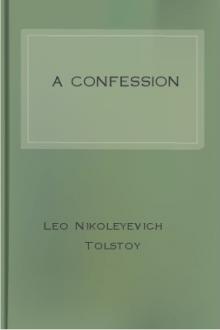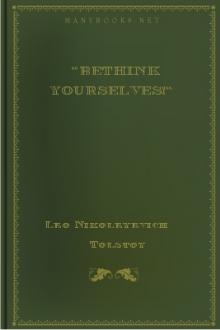A Confession by Leo Nikoleyevich Tolstoy (best sales books of all time txt) 📕

- Author: Leo Nikoleyevich Tolstoy
- Performer: -
Book online «A Confession by Leo Nikoleyevich Tolstoy (best sales books of all time txt) 📕». Author Leo Nikoleyevich Tolstoy
not be known, and that the artist and poet teach unconsciously. I was
considered an admirable artist and poet, and therefore it was very natural
for me to adopt this theory. I, artist and poet, wrote and taught without
myself knowing what. For this I was paid money; I had excellent food,
lodging, women, and society; and I had fame, which showed that what I taught
was very good.
this faith in the meaning of poetry and in the development of life was a
religion, and I was one of its priests. To be its priest was very pleasant
and profitable. And I lived a considerable time in this faith without
doubting its validity. But in the second and still more in the third year of
this life I began to doubt the infallibility of this religion and to examine
it. My first cause of doubt was that I began to notice that the priests of
this religion were not all in accord among themselves. Some said: We are the
best and most useful teachers; we teach what is needed, but the others teach
wrongly. Others said: No! we are the real teachers, and you teach wrongly.
and they disputed, quarrelled, abused, cheated, and tricked one another.
There were also many among us who did not care who was right and who was
wrong, but were simply bent on attaining their covetous aims by means of
this activity of ours. All this obliged me to doubt the validity of our
creed.
Moreover, having begun to doubt the truth of the authors’ creed itself, I
also began to observe its priests more attentively, and I became convinced
that almost all the priests of that religion, the writers, were immoral, and
for the most part men of bad, worthless character, much inferior to those
whom I had met in my former dissipated and military life; but they were
self-confident and self-satisfied as only those can be who are quite holy or
who do not know what holiness is. These people revolted me, I became
revolting to myself, and I realized that that faith was a fraud.
But strange to say, though I understood this fraud and renounced it, yet I
did not renounce the rank these people gave me: the rank of artist, poet,
and teacher. I naively imagined that I was a poet and artist and could teach
everybody without myself knowing what I was teaching, and I acted
accordingly.
From my intimacy with these men I acquired a new vice: abnormally developed
pride and an insane assurance that it was my vocation to teach men, without
knowing what.
To remember that time, and my own state of mind and that of those men
(though there are thousands like them today), is sad and terrible and
ludicrous, and arouses exactly the feeling one experiences in a lunatic
asylum.
We were all then convinced that it was necessary for us to speak, write, and
print as quickly as possible and as much as possible, and that it was all
wanted for the good of humanity. And thousands of us, contradicting and
abusing one another, all printed and wrote — teaching others. And without
noticing that we knew nothing, and that to the simplest of life’s questions:
What is good and what is evil? we did not know how to reply, we all talked
at the same time, not listening to one another, sometimes seconding and
praising one another in order to be seconded and praised in turn, sometimes
getting angry with one another — just as in a lunatic asylum.
Thousands of workmen laboured to the extreme limit of their strength day and
night, setting the type and printing millions of words which the post
carried all over Russia, and we still went on teaching and could in no way
find time to teach enough, and were always angry that sufficient attention
was not paid us.
It was terribly strange, but is now quite comprehensible. Our real innermost
concern was to get as much money and praise as possible. To gain that end we
could do nothing except write books and papers. So we did that. But in order
to do such useless work and to feel assured that we were very important
people we required a theory justifying our activity. And so among us this
theory was devised: “All that exists is reasonable. All that exists
develops. And it all develops by means of Culture. And Culture is measured
by the circulation of books and newspapers. And we are paid money and are
respected because we write books and newspapers, and therefore we are the
most useful and the best of men.” This theory would have been all very well
if we had been unanimous, but as every thought expressed by one of us was
always met by a diametrically opposite thought expressed by another, we
ought to have been driven to reflection. But we ignored this; people paid us
money and those on our side praised us, so each of us considered himself
justified.
It is now clear to me that this was just as in a lunatic asylum; but then I
only dimly suspected this, and like all lunatics, simply called all men
lunatics except myself.
[1] Nothing so forms a young man as an intimacy with a woman of good
breeding.
[2] He was in fact 27 at the time.
IIISo I lived, abandoning myself to this insanity for another six years, till
my marriage. During that time I went abroad. Life in Europe and my
acquaintance with leading and learned Europeans [3] confirmed me yet more in
the faith of striving after perfection in which I believed, for I found the
same faith among them. That faith took with me the common form it assumes
with the majority of educated people of our day. It was expressed by the
word “progress”. It then appeared to me that this word meant something. I
did not as yet understand that, being tormented (like every vital man) by
the question how it is best for me to live, in my answer, “Live in
conformity with progress”, I was like a man in a boat who when carried along
by wind and waves should reply to what for him is the chief and only
question. “whither to steer”, by saying, “We are being carried somewhere”.
I did not then notice this. Only occasionally — not by reason but by
instinct — I revolted against this superstition so common in our day, by
which people hide from themselves their lack of understanding of life… .
So, for instance, during my stay in Paris, the sight of an execution
revealed to me the instability of my superstitious belief in progress. When
I saw the head part from the body and how they thumped separately into the
box, I understood, not with my mind but with my whole being, that no theory
of the reasonableness of our present progress could justify this deed; and
that though everybody from the creation of the world had held it to be
necessary, on whatever theory, I knew it to be unnecessary and bad; and
therefore the arbiter of what is good and evil is not what people say and
do, nor is it progress, but it is my heart and I. Another instance of a
realization that the superstitious belief in progress is insufficient as a
guide to life, was my brother’s death. Wise, good, serious, he fell ill
while still a young man, suffered for more than a year, and died painfully,
not understanding why he had lived and still less why he had to die. No
theories could give me, or him, any reply to these questions during his slow
and painful dying. But these were only rare instances of doubt, and I
actually continued to live professing a faith only in progress. “Everything
evolves and I evolve with it: and why it is that I evolve with all things
will be known some day.” So I ought to have formulated my faith at that
time.
On returning from abroad I settled in the country and chanced to occupy
myself with peasant schools. This work was particularly to my taste because
in it I had not to face the falsity which had become obvious to me and
stared me in the face when I tried to teach people by literary means. Here
also I acted in the name of progress, but I already regarded progress itself
critically. I said to myself: “In some of its developments progress has
proceeded wrongly, and with primitive peasant children one must deal in a
spirit of perfect freedom, letting them choose what path of progress they
please.” In reality I was ever revolving round one and the same insoluble
problem, which was: How to teach without knowing what to teach. In the
higher spheres of literary activity I had realized that one could not teach
without knowing what, for I saw that people all taught differently, and by
quarrelling among themselves only succeeded in hiding their ignorance from
one another. But here, with peasant children, I thought to evade this
difficulty by letting them learn what they liked. It amuses me now when I
remember how I shuffled in trying to satisfy my desire to teach, while in
the depth of my soul I knew very well that I could not teach anything
needful for I did not know what was needful. After spending a year at school
work I went abroad a second time to discover how to teach others while
myself knowing nothing.
And it seemed to me that I had learnt this aborad, and in the year of the
peasants’ emancipation (1861) I returned to Russia armed with all this
wisdom, and having become an Arbiter [4] I began to teach, both the
uneducated peasants in schools and the educated classes through a magazine I
published. Things appeared to be going well, but I felt I was not quite
sound mentally and that matters could not long continue in that way. And I
should perhaps then have come to the state of despair I reached fifteen
years later had there not been one side of life still unexplored by me which
promised me happiness: that was my marriage.
For a year I busied myself with arbitration work, the schools, and the
magazine; and I became so worn out — as a result especially of my mental
confusion — and so hard was my struggle as Arbiter, so obscure the results
of my activity in the schools, so repulsive my shuffling in the magazine
(which always amounted to one and the same thing: a desire to teach
everybody and to hide the fact that I did not know what to teach), that I
fell ill, mentally rather than physically, threw up everything, and went
away to the Bashkirs in the steppes, to breathe fresh air, drink kumys [5] ,
and live a merely animal life.
Returning from there I married. The new conditions of happy family life
completely diverted me from all search for the general meaning of life. My
whole life was centred at that time in my family, wife and children, and
therefore in care to increase our means of livelihood. My striving after
self-perfection, for which I had already substituted a striving for
perfection in general, i.e. progress, was now again replaced by the effort
simply to secure the best possible conditions for myself and my family.
So another fifteen years passed.
In spite of the fact that I now regarded authorship as of no importance —
the temptation of immense monetary rewards and applause for my insignificant
work — and I devoted myself to it as a means of improving my material
position and of stifling in my soul





Comments (0)